The Week in Internet News: Online Story Time in the Age of Social Distance

Connecting online: Many libraries and authors are offering online reading sessions during recommended social distancing due to the spreading coronavirus, says Timeout.com. The article offers a list of online reading activities.
WiFi on the bus: The Charleston County School District is deploying WiFi enabled buses across its school district to bring Internet service to students stuck at home because of coronavirus-related school closings, Live5news.com reports. The WiFi on the buses has a range of up to 150 feet.
Addressing access: Other organizations are taking several steps to help students and other people who don’t have Internet access while away from school or work. Several Internet service providers are providing free WiFi service for several weeks, Boston.com reports. Boston Public Schools are also offering computers and Internet access to students. In addition, several Internet and cable companies are promising to not cut off access for unpaid bills, BangorDailyNews.com reports.
Fake virus news: Twitter will be removing harmful news related to the coronavirus outbreak, TheGuardian.com reports. Among the tweets it will remove: Denial of health authority recommendations “with the intent to influence people into acting against recommended guidance,” like encouraging people not to socially distance themselves. Also, Continue reading
Introducing the Internet Society’s 2019 Impact Report
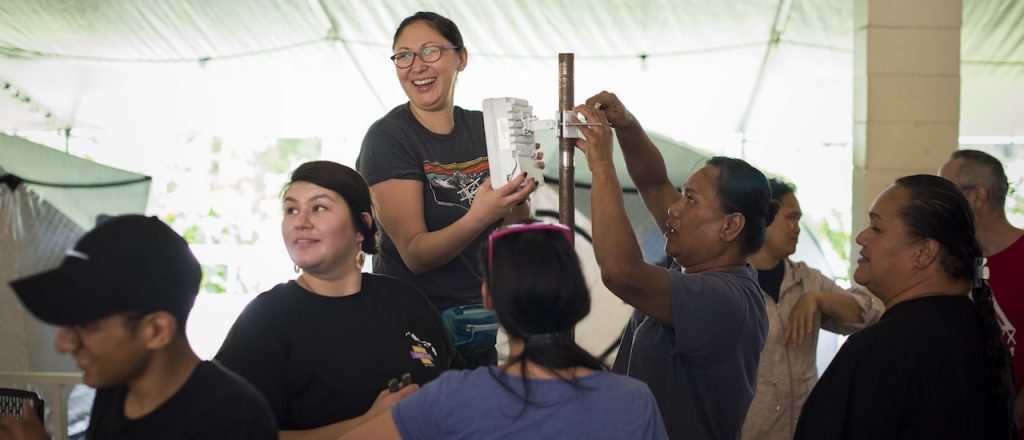
In these uncertain times we know the Internet is so much more than a tool. It’s a way for people to stay connected, informed, and educated. It shortens distances, spurs innovation, and fosters social and economic development. It empowers us and frees us.
It is a lifeline.
Yet, nearly 50% of the world still remains unconnected – and globally the Internet faces threats, each with the power to undermine the core of its existence. Now more than ever we must ensure the Internet remains open, globally connected, and secure.
The world is counting on it.
As we looked back at our work in 2019, an inspiring theme emerged: a global society driven by the idea that the Internet should be a resource for all, and persevering against odds to make this vision a reality. This society recognizes the Internet’s power as a way to stay in touch, to empower, to enable, and to create. Collectively, we are not just helping to bridge the digital divide, we are taking action to ensure the Internet remains resilient and trusted – a force for good.
Our 2019 Impact Report highlights the work of the Internet Society – our Chapters, Organization Members, individual members, Continue reading
Working from Home: Keeping It Secure and Private

With the global efforts to curb the spread of COVID-19 coronavirus underway, we’re seeing an unprecedented disruption of day-to-day operations across virtually all work sectors.
Coronavirus coverage is dominating headlines as more country borders, schools, major events and public venues are shut down in hopes of flattening the infection curve. Likewise, companies around the world are making tough calls to prioritize employee safety with business continuity in mind.
But thanks to the Internet, many workplaces are rapidly adapting operations to do their part and accommodate for what may soon become a new normal: remote working.
There are no shortage of web-based applications and services that allow us to continue core functions like meetings and collaboration that we’d do in an office-based setting. And not just the proverbial meeting that could have been an email.
But how do we ensure confidentiality when working remotely? There are some simple ways businesses and employees can ensure they are protecting themselves and their workplaces from malicious actors.
The answer is simple: encryption.
Encryption is the process of scrambling or enciphering data so it can be read only by someone with the means to return it to its original state.
It allows all our online Continue reading
The Week in Internet News: Coronavirus Shutdowns Expose Digital Divide

No Internet, no school: School closings in the U.S. in response to the coronavirus pandemic are exposing the continuing digital divide in the country, U.S. News and World Report says. The Federal Communications Commission should step in to help poor students get access, Commissioner Jessica Rosenworcel told a Senate committee recently.
Testing the Internet’s capacity: Meanwhile, there are some worries that millions of people potentially working from home in the coming weeks could literally “break the Internet,” Slate reports. Corporate VPNs, stock trading sites, and video gaming services could be among the services impacted by people working from home.
Bad news in the U.K.: In Britain, broadband networks aren’t ready for millions of people working from home, ABC14News.com reports. Many home-based Internet services in the U.K. still use old copper-based networks, and Internet users should expect congestion.
The downside of working from home: One Washington Post writer worked from home for eight days and ran into several difficulties, including Internet outages. “Video conferencing fails 50 percent of the time. The online tools I’m using — Slack, Microsoft Office, Dropbox — treat work as paramount, so it never really goes away.”
Hackers take advantage: Continue reading
Intermediary Liability: The Hidden Gem

There is a law in the United States that consists of twenty-six words: “No provider or user of an interactive computer service shall be treated as the publisher or speaker of any information provided by another information content provider.” Otherwise known as Section 230 of the Communications Decency Act (CDA), it has been characterized as the law that “created the Internet.”
Only part of this statement is true. Section 230 did not actually create the Internet because the Internet was created through the collaboration of a diverse set of people around the world. What is true, however, is that the intermediary liability regime has undergirded the Internet as we know it. It has been responsible for three primary features of the Internet:
- It has created certainty and predictability: intermediary liability rules have allowed Internet providers (both infrastructure and content) to design compliance strategies based on a limited set of laws and their Terms of Service (ToS). Because of intermediary liability, companies can design businesses that suit their needs.
- It has created good Internet citizens: intermediary liability rules have ensured that the burden of determining whether a business is going to speak in a particular way is Continue reading
The Week in Internet News: New Bill May Weaken Encryption

Unintended consequences: New legislation in the U.S. Senate to crack down on child exploitation online may lead to limits on encryption, many critics say. The EARN IT Act would give Attorney General William Barr the authority to create new rules to protect children, potentially including encryption backdoors, as Barr as called for, Wired.com reports. The bill put new conditions on Section 230 of the Communications Decency Act, which has for years protected websites from lawsuits targeting user-generated content and comments.
Voluntary steps: Meanwhile, Google, Facebook Microsoft, Twitter, Snap, and Roblox have agreed to adopt 11 voluntary principles to prevent online child sexual exploitation, CNet notes, although some critics have also suggested these rules are the first step toward weakening encryption.
Not so fast: In other encryption news, security certificate issuer Let’s Encrypt has delayed a plan to revoke more than 1 million certificates because of a recently discovered bug in its CAA (Certification Authority Authorization) code, Ars Technica reports. But because of confusion over a very short window for websites to renew their certificates, Let’s Encrypt gave them more time.
Bad certificates: Meanwhile, hackers have come up with a way to disguise malware as security certificate updates, Continue reading
Minister Bains, Let’s Rethink Canada’s Spectrum Auction

Yesterday’s announcement by the Government of Canada to drive down cell phone prices will only end up costing Canada in the long run.
In a press conference held yesterday, Minister Navdeep Bains of Innovation Science and Economic Development Canada (ISED) laid out a plan that will not only allow the government to evoke further regulation to boost competition but allow it to sell off spectrum to the highest bidder.
It is a case of short-term gain that will lead to long-term pain.
It could have been an opportunity for ISED to bring many Canadians – particularly those living in rural and remote areas – closer to the government’s goal of universal broadband for all by 2030. Unfortunately, we believe that the auction rules announced yesterday by Minister Bains for this spectrum band are a step backward for innovative approaches to bring affordable access to the regions of Canada that most need it.
Currently, Canadians pay some of the highest prices in the world to come online and much of the country still does not have fiber needed for broadband.
There are solutions to affordable access in Canada. One of which is community networks.
The Internet Society has long championed community Continue reading
Internet Society Board of Trustees Meeting on March 13-14, 2020, changed to a virtual meeting

Internet Society community members,
Due to concerns associated with the COVID-19 coronavirus, including the possibility of quarantines and other travel restrictions, the Internet Society Board of Trustees has decided to hold its meeting on 13-14 March, 2020, as a virtual meeting instead of a physical meeting in Cancun, Mexico. This board meeting was originally planned to follow the ICANN 67 meeting in Cancun, which was also changed to a virtual meeting.
The agenda and remote participation information will be published to https://www.internetsociety.org/board-of-trustees/meetings/ within the next few days.
The post Internet Society Board of Trustees Meeting on March 13-14, 2020, changed to a virtual meeting appeared first on Internet Society.
The First Ethiopia Internet Development Conference: Meeting Challenge and Opportunity Head On

When it comes to Ethiopia’s future online, there are many reasons to feel optimistic.
The country has one of the fastest-growing economies in the region, is strategically placed, and has a population of over 105 million, 60% of whom are under the age of 30. All of these are assets to make it a regional digital giant.
But this won’t happen unless Ethiopia takes some strategic moves. Internet penetration is still very low compared to its peers in Africa. The rural areas are still largely unconnected to the Internet. Only cities enjoy 3G access and 4G is only available in the capital. In spite of successive price cuts by Ethio telecom in the last year, the Internet is not affordable for the majority of Ethiopians.
It’s not that the government has not wanted to connect the rural areas. In fact, the rationale that the Ethiopian government had to keep the monopoly was to use the money generated from cities to invest in the rural areas. However, this strategy has clearly not worked since Ethiopia’s rural areas are not better connected than those in countries that have not had a government monopoly on the sector, such as Kenya.
It is Continue reading
Internet Society Ethiopia Chapter Launched Today!

We are excited about the momentum behind Ethiopia.
It is a rare moment in any country’s history to undergo such a positive transformation. It’s a time of immense optimism and investment potential. It’s not a surprise as the country also has one of the fastest-growing economies in the region, is strategically placed, and has a young population of over 105 million – half of whom are under the age of 18.
While we’ve been active in the Internet world for many years, the time to start a Chapter in Ethiopia is absolutely now. With that, let me share our “why” and introduce ourselves.
We are the Internet Society Ethiopia Chapter.
The idea of starting an Internet Society Chapter came to us during a workshop in the city of Bahir Dar, where we became conscious of the fact that more than 85% of the Ethiopia population is losing countless opportunities every day because they don’t have access to the Internet. We believe the Internet is for everyone and we are here to work with all people – from communities to businesses to governments and ordinary people to connect the unconnected and create a bigger and stronger Internet in Ethiopia. What drives Continue reading
The Week in Internet News: Let’s Encrypt Hits One Billion Certificates

Encryption wave: Let’s Encrypt, the website encryption project supported by the Internet Society, has issued 1 billion web security certificate, ZDNet reports. About 81 percent of the world’s websites now are secured with Transport Layer Security (TLS) encryption, and Let’s Encrypt, which offers free TLS certificates, now serves nearly 200 million websites.
Even more encryption: In other encryption news, the Firefox browser has begun turning on DNS over HTTPS (DoH) by default for users in the U.S., The Verge says. The encryption tool secures Internet traffic, including browsing histories.
No more WiFi: Google is shutting down a free Wi-Fi service called Station that has served parts of India, Indonesia, South Africa, Mexico, Thailand, Nigeria, Philippines, Brazil and Vietnam. TechCrunch reports. Google says the service is no longer needed because of falling prices for mobile broadband service. Google also struggled to find a business model.
Keep your hands off the network: Employees are increasingly connecting their personal Internet of Things devices, like smart watches and fitness trackers, to corporate networks, according to research by Zscaler, detailed at ZDNet. These unauthorized connections undermine network security. The most connected personal devices included digital home assistants, TV set-top boxes, video cameras, smart-home Continue reading
Is the Internet Resilient Enough to Withstand Coronavirus?

It’s being called the world’s biggest work-from-home experiment. With concerns growing over the spread of the Coronavirus, schools and businesses around the world are implementing contingency plans that encourage distance learning and work from home. Usage of e-learning, messaging, and videoconferencing tools is also growing rapidly, placing additional load on these Internet-based applications and platforms and generating additional traffic. And with more people staying at home, online media consumption is poised to increase as well.
Many are wondering if the Internet can handle the strain of rapid traffic growth and increased latency. Will it cause a catastrophic failure of the Internet? The answer: not likely.
Core Internet infrastructure providers should be able to easily absorb the increase in traffic and demand, especially if the growth is gradual over a period of days, weeks, or months. Cloud infrastructure providers should also have sufficient additional compute, storage, and bandwidth capacity to enable their customers, including the e-learning, messaging, and videoconferencing tool providers, to scale their systems as necessary. In order to keep traffic local, content delivery infrastructure from companies including Akamai, Cloudflare, Google, Netflix, and Apple is deployed in many last-mile networks. Internet Exchange Points (IXPs) can also help keep traffic local, Continue reading
APRICOT 2020: Routing Security Takes Center Stage
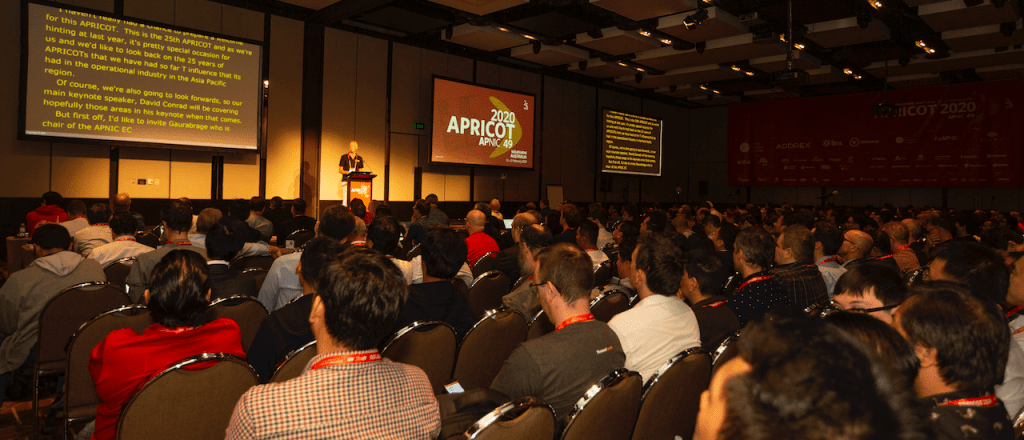
More than 600 of the world’s leading Internet engineers from 60 economies gathered last week at APRICOT, and it was encouraging to see routing security take center stage in the largest meeting of the technical community in the region.
The Internet Society is a long-time partner of the annual event, also called the Asia Pacific Regional Internet Conference on Operational Technologies, and this year we held two community gatherings, spoke in several sessions, and ran a booth throughout the conference.
The ten-day meeting consisted of workshops, tutorials, conference sessions, birds-of-a-feather sessions, and peering forums from 12-21 February in Melbourne, Australia. This year marked the 25th anniversary of APRICOT, and it was good to recognize how the event has grown over time and contributed to technical capacity building in the region. It also gave me the chance to reflect on my own participation in the event over the years, including from when I was in the private sector prior to my current role.
One of the things Internet builders get together for at APRICOT is to share the technical knowledge needed to run and expand the Internet securely. So it was a great opportunity to bring attention to the Mutually Continue reading
The Week in Internet News: ISPs Sue Maine Over New Privacy Law
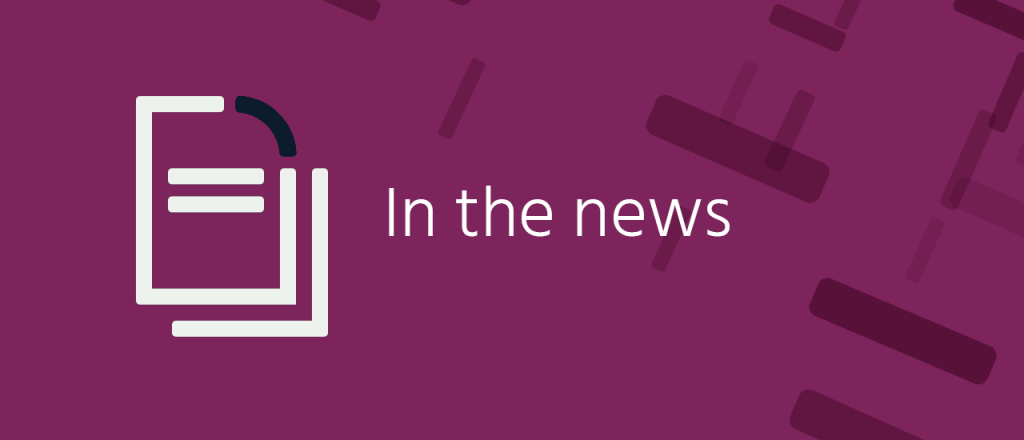
Protesting privacy: Four ISP trade groups are suing the state of Maine for a privacy law that goes into effect this year, Ars Technica reports. Among other things, the law supposedly violates ISP free speech rights because it limits their ability to advertise to their customers and to offer discounts in exchange for customers’ personal information. The Maine law requires ISPs to get customers’ opt-in consent before using or sharing sensitive data.
DSL over fiber: The California Advanced Services Fund, a program launched in 2008 to connect all Californians to broadband, was an early success, but recent actions in the state legislature have encouraged slow speeds of 6 Mbps and eliminated the fund’s ability to serve public housing already served by slow DSL service, the EFF says in a blog post. “By establishing an abysmally low standard based on DSL technology that made its debut more than a decade ago, the state’s regulator is forced to conclude that basically everyone has useful broadband access today,” the EFF says. “This has kept the state from closing the digital divide.”
It’s getting better: Nigeria is making great strides in getting residents connected to the Internet, the BBC reports. More than Continue reading
NDSS 2020: The Best in Security Research – For the Good of the Internet

On 23 February, the 27th consecutive Network and Distributed System Security Symposium (NDSS) kicks off in San Diego, CA. NDSS is a premier academic research conference addressing a wide range of topics on network and system security. It’s an incubator for new, innovative ideas and research on the security and privacy of the Internet.
NDSS 2020 (23-26 February) will be one of the biggest NDSS symposium yet, featuring 88 peer-reviewed academic papers, 34 posters, 5 workshops, and 2 keynotes on vital and timely topics. Here are some of the highlights.
Workshops
This year’s program officially starts with five workshops on Sunday, 23 February. NDSS workshops are organized around a single topic and provide an opportunity for greater dialogue between researchers and practitioners in the area.
The QUIC Privacy and Security (QUIPS) Workshop focuses on QUIC security and privacy analysis efforts. The IETF QUIC protocol is a modern UDP-based, stream-multiplexing, encrypted transport protocol. Inspired by prior art, QUIC’s packet and header encryption removes cleartext information from the network while simultaneously mitigating ossification of version-specific protocol behavior. The goal of the QUIPS workshop is to bring formal analysis results to the IETF working group and developer communities in order to build confidence Continue reading
Canada’s Innovative Future Relies on Upholding Core Properties of the Capital ‘I’ Internet

As Canada considers how to renew its broadcasting and telecommunications regulatory regime, it should steer clear of recent recommendations that would impact key Internet properties that foster Canadian innovation online.
On Jan. 29 the Broadcasting and Telecommunications Legislative Review (BTLR) panel handed the Canadian government 97 recommendations to consider as it prepares new legislation to update the decades-old Telecommunications Act, Radiocommunication Act and Broadcasting Act.
While it has laudable advice on how to improve access to rural and remote Indigenous communities in Canada, the report’s major flaws would inhibit the same Canadian innovation the recommendations intend to promote.
This includes giving Canadian Radio-television and Telecommunications Commission (CRTC) the authority to treat the Internet like a broadcasting network, and setting unrealistic rules that would harm crucial elements of the Internet in the name of promoting Canadian content online.
There are many reasons you can’t treat the Internet like a traditional broadcaster, but the key one is this: the Internet is not like other technologies.
While it is essentially just an interconnected network of networks – hence the name: Inter-net – the Internet was built with a unique set of properties that were critical to its success to date: openness, decentralization, Continue reading
The Week in Internet News: CIA Had Encryption Backdoor for Decades
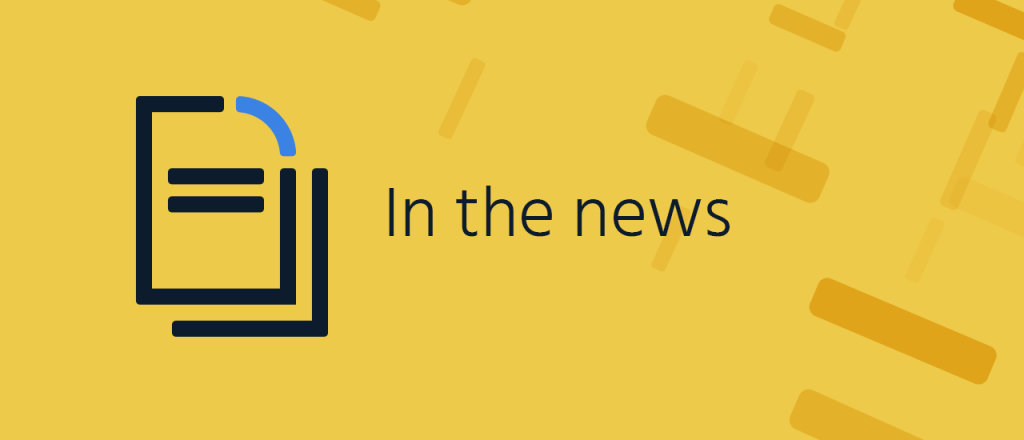
We’re watching you: The U.S. CIA secretly had an ownership stake in Swiss encryption company Crypto AG for decades and was able to read encrypted messages sent using the company’s technology, the Washington Post reports. West German intelligence agencies worked with the CIA. Forbes columnist Jody Westby called for a congressional investigation.
We’re watching you, part two: Meanwhile, Russia’s Federal Security Service has ordered some large Internet companies in the country to give it continuous access to their systems, the New York Times reports. The FSB has targeted more than 200 companies, including popular messenger service Telegram, social network VK. and classified advertisement website Avito.ru.
Big bucks for space-based Internet: Astranis, a satellite Internet startup focused on bringing service to underserved areas, has raised $90 million in new funding, Fortune says. The new funding will help Astranis deploy its first satellite, focused on providing Internet service in Alaska.
Not so fast: Satellites, however, have some downsides, according to a story on TheConversation.com. Satellites are vulnerable to cyberattacks, with hackers potentially able to shut them down or even turn them into weapons, the story suggests.
New privacy push: U.S. Senator Kirsten Gillibrand, a New York Democrat, has Continue reading
Member News: Internet Society Chapters Focus on Security
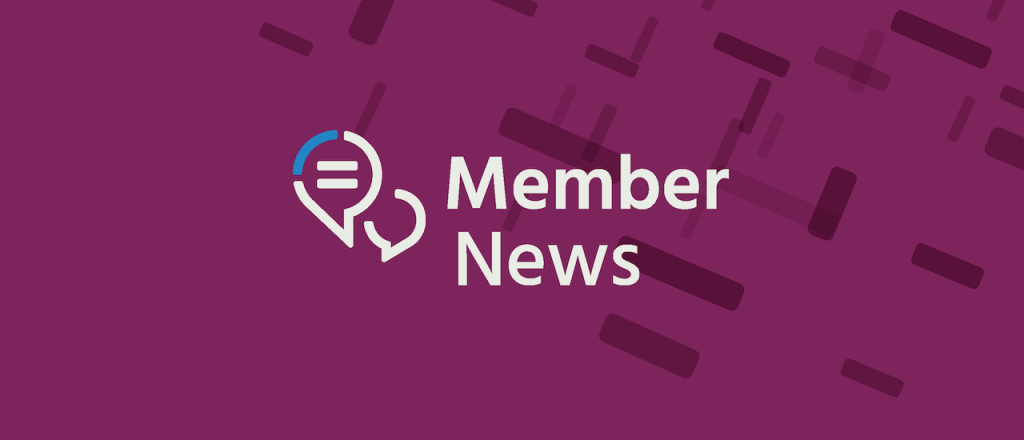
Security on your mind: The Internet Society’s Chapter in Benin recently hosted a conference focused on online security and on connectivity issues. Much of the discussion focused on instability of connections in the country, with participants concerned about degraded connections. Participants also talked about limited coverage for mobile services. On the topic of security, speakers urged Internet users to regularly change their passwords, avoid default passwords, and prevent third-party apps from connecting to the services they use.
Secure messages: The Israeli Chapter has focused on the security of messaging and social media apps recently. The Chapter recently posted a guide on how to prevent Instagram accounts from being hacked and a guide on how users can protect their privacy on the Tik Tok messaging app.
Privacy for the young ones: Meanwhile, the Chapter in Portugal, working with the Kids Safe on the Net project, has launched an initiative to improve awareness among Portuguese youth about the importance of online privacy and how they can maintain their privacy.
Good privacy: The Netherlands Chapter recently gave its support to the Good ID initiative, an approach to identity management that prioritizes data privacy and security. Good ID aims to give Internet users Continue reading
Let’s Improve Routing Security at APRICOT 2020

Internet builders in Asia-Pacific get together around this time every year at APRICOT to learn from each other and other leaders from around the world. Routing security will be a key theme, and we will be sharing in multiple sessions why the MANRS initiative is important to the global routing system.
Also called the Asia-Pacific Regional Internet Conference on Operational Technologies, the conference is the largest meeting of the technical community in the region. It draws many of the world’s best Internet engineers, operators, researchers, service providers, and policy enthusiasts from over 50 countries to learn, share, and network.
Held annually, the ten-day meeting consists of workshops, tutorials, and conference sessions, birds-of-a-feather (BoFs) sessions, and peering forums all with the goal of spreading the knowledge needed to run and expand the Internet.
Technical training workshops will run from Feb 12 to 16, and the conference itself from 17 to 21 in Melbourne, Australia.
Our team at the Mutually Agreed Norms for Routing Security (MANRS) initiative will speak at various sessions throughout the conference, including the Resource Public Key Infrastructure (RPKI) Deployathon on 17 February that I will facilitate. I will also be chairing the inaugural APNIC Routing Security/RPKI SIG on 20 February.
RPKI Continue reading
Every Day Should Be Safer Internet Day

Safer Internet Day is an opportunity for people and organizations around the world to join forces in a series of activities and events dedicated to working towards a more secure Internet. I’m really excited to take part in the activities organized by the Brazilian hub of Safer Internet Day, where the topic of encryption in the Latin American and the Carribean region is going to be discussed in one of the panels.
It’s great to have a day dedicated to building a more secure Internet for everyone, however, the reality for most people championing digital security is that every day is safer Internet day. This is certainly the case at the Internet Society. Our global community of staff, Chapters, members, partners, and supporters are deeply committed to an open, globally-connected, secure, and trustworthy Internet for all. That’s why we aligned our 2020 Action Plan to focus on building a bigger and stronger Internet for everyone.
Digital security is the foundation of our connected economies and societies – and encryption is the bedrock of digital security. It protects the integrity, confidentiality, and authenticity of data and communications. And as a colleague of mine always says, “when we fail to protect data, Continue reading